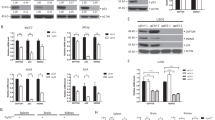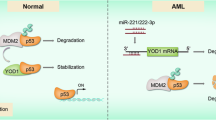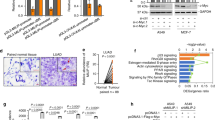Abstract
MDMX is a heterodimeric partner of MDM2 and a critical regulator of p53. The MDMX level is generally elevated in tumors with wild-type p53 and contributes to p53 inactivation. MDMX degradation is controlled in part by MDM2-mediated ubiquitination. Here, we show that MDMX turnover is highly responsive to changes in MDM2 level in non-transformed cells, but not in tumor cells. We found that loss of alternate reading frame (ARF) expression, which occurs in most tumors with wild-type p53, significantly reduces MDMX sensitivity to MDM2. Restoration of ARF expression in tumor cells enables MDM2 to degrade MDMX in a dose-dependent manner. ARF binds to MDM2 and stimulates a second-site interaction between the central region of MDM2 and MDMX, and thus increases MDMX–MDM2 binding and MDMX ubiquitination. These results reveal an important abnormality in the p53-regulatory pathway as a consequence of ARF deficiency. Loss of ARF during tumor development not only prevents p53 stabilization by proliferative stress but also causes accumulation of MDMX that compromises p53 activity. This phenomenon may reduce the clinical efficacy of MDM2-specific inhibitors by preventing MDMX downregulation.
This is a preview of subscription content, access via your institution
Access options
Subscribe to this journal
Receive 50 print issues and online access
$259.00 per year
only $5.18 per issue
Buy this article
- Purchase on Springer Link
- Instant access to full article PDF
Prices may be subject to local taxes which are calculated during checkout










Similar content being viewed by others
References
Badciong JC, Haas AL . (2002). MdmX is a RING finger ubiquitin ligase capable of synergistically enhancing Mdm2 ubiquitination. J Biol Chem 277: 49668–49675.
Bothner B, Lewis WS, DiGiammarino EL, Weber JD, Bothner SJ, Kriwacki RW . (2001). Defining the molecular basis of Arf and Hdm2 interactions. J Mol Biol 314: 263–277.
Chen D, Shan J, Zhu WG, Qin J, Gu W . (2010). Transcription-independent ARF regulation in oncogenic stress-mediated p53 responses. Nature 464: 624–627.
Chen J, Marechal V, Levine AJ . (1993). Mapping of the p53 and mdm-2 interaction domains. Mol Cell Biol 13: 4107–4114.
Chen L, Gilkes DM, Pan Y, Lane WS, Chen J . (2005). ATM and Chk2-dependent phosphorylation of MDMX contribute to p53 activation after DNA damage. EMBO J 24: 3411–3422.
Cheng Q, Chen L, Li Z, Lane WS, Chen J . (2009). ATM activates p53 by regulating MDM2 oligomerization and E3 processivity. EMBO J 28: 3857–3867.
Cross B, Chen L, Cheng Q, Li B, Yuan ZM, Chen J . (2011). Inhibition of p53 DNA binding function by the MDM2 protein acidic domain. J Biol Chem 286: 16018–16029.
Dang J, Kuo ML, Eischen CM, Stepanova L, Sherr CJ, Roussel MF . (2002). The RING domain of Mdm2 can inhibit cell proliferation. Cancer Res 62: 1222–1230.
Danovi D, Meulmeester E, Pasini D, Migliorini D, Capra M, Frenk R et al. (2004). Amplification of Mdmx (or Mdm4) directly contributes to tumor formation by inhibiting p53 tumor suppressor activity. Mol Cell Biol 24: 5835–5843.
Ding K, Lu Y, Nikolovska-Coleska Z, Wang G, Qiu S, Shangary S et al. (2006). Structure-based design of spiro-oxindoles as potent, specific small-molecule inhibitors of the MDM2-p53 interaction. J Med Chem 49: 3432–3435.
Gilkes DM, Chen L, Chen J . (2006). MDMX regulation of p53 response to ribosomal stress. EMBO J 25: 5614–5625.
Grier JD, Xiong S, Elizondo-Fraire AC, Parant JM, Lozano G . (2006). Tissue-specific differences of p53 inhibition by Mdm2 and Mdm4. Mol Cell Biol 26: 192–198.
Gu J, Kawai H, Nie L, Kitao H, Wiederschain D, Jochemsen AG et al. (2002). Mutual dependence of MDM2 and MDMX in their functional inactivation of p53. J Biol Chem 277: 19251–19254.
Hu B, Gilkes DM, Farooqi B, Sebti SM, Chen J . (2006). MDMX overexpression prevents p53 activation by the MDM2 inhibitor Nutlin. J Biol Chem 281: 33030–33035.
Itahana K, Mao H, Jin A, Itahana Y, Clegg HV, Lindstrom MS et al. (2007). Targeted inactivation of Mdm2 RING finger E3 ubiquitin ligase activity in the mouse reveals mechanistic insights into p53 regulation. Cancer Cell 12: 355–366.
Jones SN, Roe AE, Donehower LA, Bradley A . (1995). Rescue of embryonic lethality in Mdm2-deficient mice by absence of p53. Nature 378: 206–208.
Kamijo T, Zindy F, Roussel MF, Quelle DE, Downing JR, Ashmun RA et al. (1997). Tumor suppression at the mouse INK4a locus mediated by the alternative reading frame product p19ARF. Cell 91: 649–659.
Kawai H, Wiederschain D, Kitao H, Stuart J, Tsai KK, Yuan ZM . (2003a). DNA damage-induced MDMX degradation is mediated by MDM2. J Biol Chem 278: 45946–45953.
Kawai H, Wiederschain D, Yuan ZM . (2003b). Critical contribution of the MDM2 acidic domain to p53 ubiquitination. Mol Cell Biol 23: 4939–4947.
Laurie NA, Donovan SL, Shih CS, Zhang J, Mills N, Fuller C et al. (2006). Inactivation of the p53 pathway in retinoblastoma. Nature 444: 61–66.
Li B, Cheng Q, Li Z, Chen J . (2010). p53 inactivation by MDM2 and MDMX negative feedback loops in testicular germ cell tumors. Cell Cycle 9: 1411–1420.
Li C, Chen L, Chen J . (2002). DNA damage induces MDMX nuclear translocation by p53-dependent and -independent mechanisms. Mol Cell Biol 22: 7562–7571.
Linares LK, Hengstermann A, Ciechanover A, Muller S, Scheffner M . (2003). HdmX stimulates Hdm2-mediated ubiquitination and degradation of p53. Proc Natl Acad Sci USA 100: 12009–12014.
Linke K, Mace PD, Smith CA, Vaux DL, Silke J, Day CL . (2008). Structure of the MDM2/MDMX RING domain heterodimer reveals dimerization is required for their ubiquitylation in trans. Cell Death Differ 15: 841–848.
Macias E, Jin A, Deisenroth C, Bhat K, Mao H, Lindstrom MS et al. (2010). An ARF-independent c-MYC-activated tumor suppression pathway mediated by ribosomal protein-Mdm2 Interaction. Cancer Cell 18: 231–243.
Maetens M, Doumont G, Clercq SD, Francoz S, Froment P, Bellefroid E et al. (2007). Distinct roles of Mdm2 and Mdm4 in red cell production. Blood 109: 2630–2633.
Meulmeester E, Frenk R, Stad R, de Graaf P, Marine JC, Vousden KH et al. (2003). Critical role for a central part of Mdm2 in the ubiquitylation of p53. Mol Cell Biol 23: 4929–4938.
Midgley CA, Desterro JM, Saville MK, Howard S, Sparks A, Hay RT et al. (2000). An N-terminal p14ARF peptide blocks Mdm2-dependent ubiquitination in vitro and can activate p53 in vivo. Oncogene 19: 2312–2323.
Millard M, Pathania D, Grande F, Xu S, Neamati N . (2011). Small-molecule inhibitors of p53-MDM2 interaction: the 2006–2010 update. Curr Pharma Design 17: 536–559.
Montes de Oca Luna R, Wagner DS, Lozano G . (1995). Rescue of early embryonic lethality in mdm2-deficient mice by deletion of p53. Nature 378: 203–206.
Okamoto K, Kashima K, Pereg Y, Ishida M, Yamazaki S, Nota A et al. (2005). DNA damage-induced phosphorylation of MdmX at serine 367 activates p53 by targeting MdmX for Mdm2-dependent degradation. Mol Cell Biol 25: 9608–9620.
Pan Y, Chen J . (2003). MDM2 promotes ubiquitination and degradation of MDMX. Mol Cell Biol 23: 5113–5121.
Parant J, Chavez-Reyes A, Little NA, Yan W, Reinke V, Jochemsen AG et al. (2001). Rescue of embryonic lethality in Mdm4-null mice by loss of Trp53 suggests a nonoverlapping pathway with MDM2 to regulate p53. Nat Genet 29: 92–95.
Patton JT, Mayo LD, Singhi AD, Gudkov AV, Stark GR, Jackson MW . (2006). Levels of HdmX expression dictate the sensitivity of normal and transformed cells to Nutlin-3. Cancer Res 66: 3169–3176.
Pereg Y, Shkedy D, de Graaf P, Meulmeester E, Edelson-Averbukh M, Salek M et al. (2005). Phosphorylation of Hdmx mediates its Hdm2- and ATM-dependent degradation in response to DNA damage. Proc Natl Acad Sci USA 102: 5056–5061.
Phillips A, Teunisse A, Lam S, Lodder K, Darley M, Emaduddin M et al. (2010). HDMX-L is expressed from a functional p53-responsive promoter in the first intron of the HDMX gene and participates in an autoregulatory feedback loop to control p53 activity. J Biol Chem 285: 29111–29127.
Ramos YF, Stad R, Attema J, Peltenburg LT, van der Eb AJ, Jochemsen AG . (2001). Aberrant expression of HDMX proteins in tumor cells correlates with wild-type p53. Cancer Res 61: 1839–1842.
Sasaki M, Nie L, Maki CG . (2007). MDM2 binding induces a conformational change in p53 that is opposed by heat-shock protein 90 and precedes p53 proteasomal degradation. J Biol Chem 282: 14626–14634.
Shangary S, Qin D, McEachern D, Liu M, Miller RS, Qiu S et al. (2008). Temporal activation of p53 by a specific MDM2 inhibitor is selectively toxic to tumors and leads to complete tumor growth inhibition. Proc Natl Acad Sci USA 105: 3933–3938.
Sherr CJ . (2006). Divorcing ARF and p53: an unsettled case. Nat Rev Cancer 6: 663–673.
Shvarts A, Bazuine M, Dekker P, Ramos YF, Steegenga WT, Merckx G et al. (1997). Isolation and identification of the human homolog of a new p53-binding protein, Mdmx. Genomics 43: 34–42.
Sivakolundu SG, Nourse A, Moshiach S, Bothner B, Ashley C, Satumba J et al. (2008). Intrinsically unstructured domains of Arf and Hdm2 form bimolecular oligomeric structures in vitro and in vivo. J Mol Biol 384: 240–254.
Stott FJ, Bates S, James MC, McConnell BB, Starborg M, Brookes S et al. (1998). The alternative product from the human CDKN2A locus, p14(ARF), participates in a regulatory feedback loop with p53 and MDM2. EMBO J 17: 5001–5014.
Tanimura S, Ohtsuka S, Mitsui K, Shirouzu K, Yoshimura A, Ohtsubo M . (1999). MDM2 interacts with MDMX through their RING finger domains. FEBS Lett 447: 5–9.
Terzian T, Wang Y, Van Pelt CS, Box NF, Travis EL, Lozano G . (2007). Haploinsufficiency of Mdm2 and Mdm4 in tumorigenesis and development. Mol Cell Biol 27: 5479–5485.
Vassilev LT, Vu BT, Graves B, Carvajal D, Podlaski F, Filipovic Z et al. (2004). In vivo activation of the p53 pathway by small-molecule antagonists of MDM2. Science 303: 844–848.
Wade M, Wong ET, Tang M, Stommel JM, Wahl GM . (2006). Hdmx modulates the outcome of p53 activation in human tumor cells. J Biol Chem 281: 33036–33044.
Wang X, Arooz T, Siu WY, Chiu CH, Lau A, Yamashita K et al. (2001). MDM2 and MDMX can interact differently with ARF and members of the p53 family. FEBS Lett 490: 202–208.
Wang YV, Leblanc M, Wade M, Jochemsen AG, Wahl GM . (2009). Increased radioresistance and accelerated B cell lymphomas in mice with Mdmx mutations that prevent modifications by DNA-damage-activated kinases. Cancer Cell 16: 33–43.
Wu X, Bayle JH, Olson D, Levine AJ . (1993). The p53-mdm-2 autoregulatory feedback loop. Genes Dev 7: 1126–1132.
Xia M, Knezevic D, Tovar C, Huang B, Heimbrook DC, Vassilev LT . (2008). Elevated MDM2 boosts the apoptotic activity of p53-MDM2 binding inhibitors by facilitating MDMX degradation. Cell Cycle 7: 1604–1612.
Xiong S, Pant V, Suh YA, Van Pelt CS, Wang Y, Valentin-Vega YA et al. (2010). Spontaneous tumorigenesis in mice overexpressing the p53-negative regulator Mdm4. Cancer Res 70: 7148–7154.
Xiong S, Van Pelt CS, Elizondo-Fraire AC, Liu G, Lozano G . (2006). Synergistic roles of Mdm2 and Mdm4 for p53 inhibition in central nervous system development. Proc Natl Acad Sci USA 103: 3226–3231.
Zhang Y, Lu H . (2009). Signaling to p53: ribosomal proteins find their way. Cancer Cell 16: 369–377.
Acknowledgements
We thank Dr Dawn Quelle for NARF6 cells and Dr Yanping Zhang for ARF-null MEF. This work was supported in part by grants from the National Institutes of Health (CA141244, CA109636 and CA118210).
Author information
Authors and Affiliations
Corresponding author
Ethics declarations
Competing interests
The authors declare no conflict of interest.
Additional information
Supplementary Information accompanies the paper on the Oncogene website ()
Rights and permissions
About this article
Cite this article
Li, X., Gilkes, D., Li, B. et al. Abnormal MDMX degradation in tumor cells due to ARF deficiency. Oncogene 31, 3721–3732 (2012). https://doi.org/10.1038/onc.2011.534
Received:
Revised:
Accepted:
Published:
Issue Date:
DOI: https://doi.org/10.1038/onc.2011.534
Keywords
This article is cited by
-
MDM2 oligomers: antagonizers of the guardian of the genome
Oncogene (2016)
-
Mdmx promotes genomic instability independent of p53 and Mdm2
Oncogene (2015)



